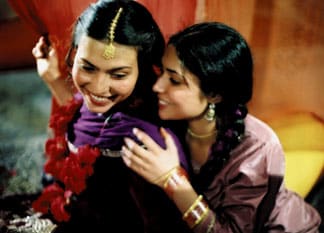1979 was a hard year to be in Pakistan: General Zia-ul-Haq had taken the reins, the Muslim faith had been institutionalised and anyone who questioned the new religious order was in danger of being ostracised or worse. But 1947 was even worse, especially if you were a woman: the acrimony of the Partition caused Sikhs and Muslims to not only slaughter each other but abduct and rape the women, obliging them to either die to protect their families' honour or marry their captors as conquered subjects. And so it comes to pass that a woman who survived the nightmare of '47 must see it rise again.
Khamosh Pani is the story of her son's slide into religious fundamentalism, turning from gentle music lover to sullen zealot with the new regime's promise of a higher purpose, while never realising that his mother was a non-Muslim victim until long after he's reached the point of no return. But given this grim subject matter (and supremely damning ending), it's a surprisingly affirmative movie, scrupulously careful not to contribute to the cycle of attack-and-counterattack, siding with the victims instead of wading into the mob.
Writer Paromita Vohra's dramaturgy is a little clumsy, with some irritatingly cute character establishment and dialogue that's a little too obvious, but director Sabiha Sumar smoothes things over with some gently pleasing compositions that capture the humane tone the material is trying to strike. And by the time the film spins inexorably into its downward spiral, all aesthetic niggling will be completely forgotten. (Mongrel Media)
Khamosh Pani is the story of her son's slide into religious fundamentalism, turning from gentle music lover to sullen zealot with the new regime's promise of a higher purpose, while never realising that his mother was a non-Muslim victim until long after he's reached the point of no return. But given this grim subject matter (and supremely damning ending), it's a surprisingly affirmative movie, scrupulously careful not to contribute to the cycle of attack-and-counterattack, siding with the victims instead of wading into the mob.
Writer Paromita Vohra's dramaturgy is a little clumsy, with some irritatingly cute character establishment and dialogue that's a little too obvious, but director Sabiha Sumar smoothes things over with some gently pleasing compositions that capture the humane tone the material is trying to strike. And by the time the film spins inexorably into its downward spiral, all aesthetic niggling will be completely forgotten. (Mongrel Media)




